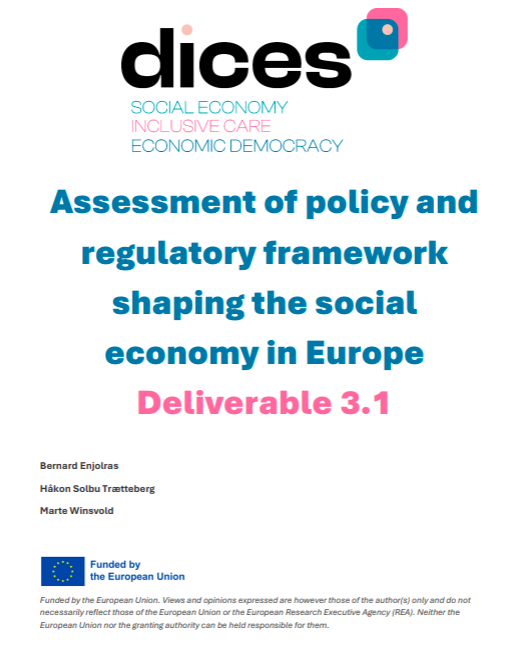European policymakers and researchers have warned that rising social exclusion, the struggle to create quality jobs, and pressure on welfare systems remain among the continent’s most persistent challenges. The social economy, including cooperatives, associations, foundations, and social enterprises, has increasingly been identified as part of the response. But analysts note that the scope for these organisations to act is shaped less by their mission than by the policies and regulatory frameworks in which they operate.
As part of our goal to tackle social exclusion across Europe, the DICES consortium has prepared a new working paper, Assessment of Policy and Regulatory Framework Shaping the Social Economy in Europe, authored by Bernard Enjolras, Håkon Solbu Trætteberg, and Marte Winsvold from the Institute for Social Research. The paper examines how different welfare regimes, national policies, and EU-level initiatives affect the opportunities and constraints faced by social economy actors in care provision.
Two perspectives
We approach the issue from two directions. First, an analysis of how welfare state regimes (liberal, corporatist, Nordic, Southern European, and post-socialist) provide varying degrees of space for the social economy was carried out. For instance, corporatist systems integrate social economy organisations deeply, while in liberal and post-socialist contexts, they often remain marginal. Nordic regimes combine universal public provision with meaningful roles for social economy actors, whereas Southern European systems are fragmented.
Second, we review dedicated policies and frameworks for the social economy at both the EU and national levels. The 2021 Social Economy Action Plan represents a significant step forward, but implementation and recognition differ widely across member states.
To illustrate how these frameworks play out in practice, the paper explores two care fields: long-term care (LTC) and services for refugees and asylum seekers. Welfare regimes provide a strong basis for understanding variation in LTC provision, while refugee services are shaped more by politics and international obligations.
Why this matters
Our findings highlight that understanding the social economy requires combining macro-level comparisons with field-specific analysis. While regime typologies offer useful context, they cannot provide an exhaustive explanation. Social economy organisations often step in where public and commercial provision falls short, but their role is increasingly shaped by marketisation and competitive procurement.
This paper is part of the DICES project’s wider effort to map and understand the social economy in Europe. We invite policymakers, practitioners, and researchers to read the full report. By placing the social economy within welfare and regulatory structures, the study contributes to a clearer vision of how this sector can strengthen democracy, inclusion, and sustainable employment across Europe.
Read the full publication here.
This paper is part of the DICES Work Package 3, Deliverable 3.1.


